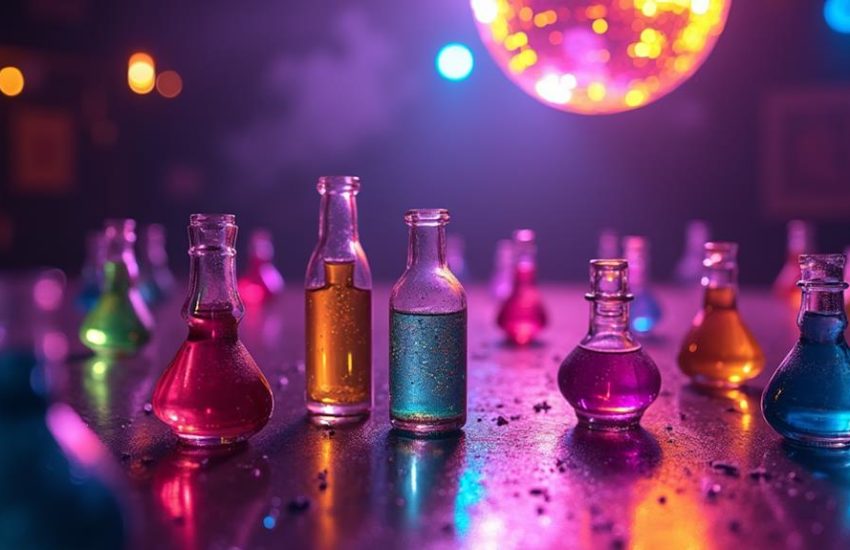From Dance Floor to ER: The Dangerous Damage Poppers Can Do
Poppers, volatile alkyl nitrites used for euphoric effects, can quickly turn a night out into a medical emergency. These substances cause rapid drops in blood pressure, leading to dizziness, fainting, and severe headaches. Inhalation irritates the respiratory system, whereas skin contact may trigger allergic reactions. Long-term use is associated with cognitive impairment, vision problems, and cardiovascular risks. Fatal interactions with erectile dysfunction medications are possible. In spite of varying legal status globally, poppers remain accessible in many areas. Understanding the full spectrum of health consequences and implementing harm reduction strategies is vital for those considering or currently using these substances.
What Are Poppers?

Within the domain of recreational substances, poppers refer to a group of volatile alkyl nitrites, primarily used for their euphoric and muscle-relaxing effects. These inhalants have a rich poppers history dating back to the 19th century when amyl nitrite was first synthesized for medical purposes.
Over time, their recreational use gained popularity, particularly in LGBTQ+ communities and nightlife scenes.
Poppers effects are rapid and short-lived, typically lasting only a few minutes. Users report feelings of lightheadedness, increased heart rate, and a rush of warmth. The muscle-relaxing properties of poppers have made them particularly popular for enhancing sexual experiences.
Nevertheless, it's essential to understand that these substances can pose significant health risks, including dizziness, headaches, and potentially dangerous drops in blood pressure. In some cases, visual disturbances, such as neon snowflakes, have been reported.
As with any recreational substance, users should be aware of the potential dangers and make informed decisions.
Short-Term Health Risks

Even though the effects of poppers may seem appealing to some users, it's important to contemplate the short-term health risks associated with their use. The acute effects of poppers can be dangerous and potentially life-threatening. Recreational use often leads to sudden drops in blood pressure, causing dizziness, fainting, and in severe cases, loss of consciousness.
Users may experience intense headaches, nausea, and temporary vision problems, including blurred sight or seeing "spots." Inhaling poppers can irritate the respiratory system, leading to coughing, wheezing, and shortness of breath. Some individuals may develop allergic reactions, resulting in skin rashes or swelling.
Furthermore, poppers can interact negatively with other substances, particularly medications for erectile dysfunction, potentially causing a fatal drop in blood pressure. Understanding these risks is vital for those seeking a sense of belonging in social settings where poppers are present.
In addition, the risk of sudden death from asphyxiation or cardiovascular events cannot be overlooked, regardless of dosage.
Long-Term Consequences

The long-term consequences of popper use extend far beyond the immediate risks, potentially causing lasting damage to various body systems. Chronic exposure to these substances has been linked to significant neurological effects, including cognitive impairment and peripheral neuropathy. Users may experience memory loss, difficulty concentrating, and decreased motor function over time.
Moreover, reports of eye issues such as popper maculopathy have increased among users, leading to concerns about vision loss. Chronic use is likewise associated with irreversible brain damage, particularly in the cerebral cortex and cerebellum.
Cardiovascular risks associated with long-term popper use are equally concerning. Prolonged abuse can lead to heart arrhythmias, weakened blood vessels, and an increased risk of heart attacks.
Furthermore, poppers may contribute to the development of eye problems, such as retinal damage and vision loss. The immune system can also be compromised, making users more susceptible to infections and diseases.
As part of the club culture, it's vital to understand these risks and prioritize long-term health over temporary euphoria.
Legal Status and Availability

Legal regulations surrounding poppers vary greatly across different countries and jurisdictions, reflecting the complex nature of their status and availability. The legal implications and market accessibility of poppers differ globally, with some nations imposing strict bans whereas others maintain more lenient policies.
This inconsistency creates challenges for both users and law enforcement agencies. Some users are unaware that the inhaled chemical is not amyl nitrite used for Angina treatment. In addition, warnings about the dangers of poppers are rarely seen in queer-oriented advertising.
Key points regarding the legal status and availability of poppers:
- Some countries classify poppers as controlled substances
- In certain regions, they are sold as room odorizers or leather cleaners
- Online marketplaces have increased accessibility
- Regulatory bodies struggle to keep pace with new formulations
- Legal gray areas exist in many jurisdictions
Understanding the legal framework is vital for users to avoid potential legal consequences. The diverse regulatory approaches highlight the ongoing debate surrounding poppers' classification, use, and distribution, emphasizing the need for clear, consistent policies to address public health concerns and market accessibility.
Harm Reduction Strategies

Harm reduction strategies play a vital role in mitigating the potential risks associated with popper use. Safe usage practices include avoiding mixing poppers with other substances, particularly erectile dysfunction medications, and refraining from ingestion.
Community education initiatives focus on raising awareness about potential health risks and proper handling techniques. It's likewise important to note the significant eye issues that can arise from popper use, such as blurred vision and central vision loss, which users should be aware of.
Key harm reduction measures involve using poppers in well-ventilated areas, avoiding skin contact, and storing them properly to prevent accidental exposure. Users are advised to start with small amounts and be aware of individual tolerance levels. Recognizing signs of adverse reactions and seeking immediate medical attention when necessary are vital aspects of harm reduction.
Support networks and peer-led education programs within the LGBTQ+ community can effectively disseminate accurate information about poppers, promoting safer use practices and encouraging a sense of collective responsibility for harm reduction.
Call Us To Assist You
Poppers, as they offer fleeting euphoria, harbor insidious risks that echo beyond the night's revelry. From acute health hazards to potential long-term damage, these volatile substances demand scrutiny. Their legal ambiguity further complicates efforts to regulate and educate. As the beat goes on, implementing harm reduction strategies becomes paramount. Like Icarus flying too close to the sun, uninformed use of poppers may lead to a precipitous fall, underscoring the need for awareness and caution in recreational pursuits.


